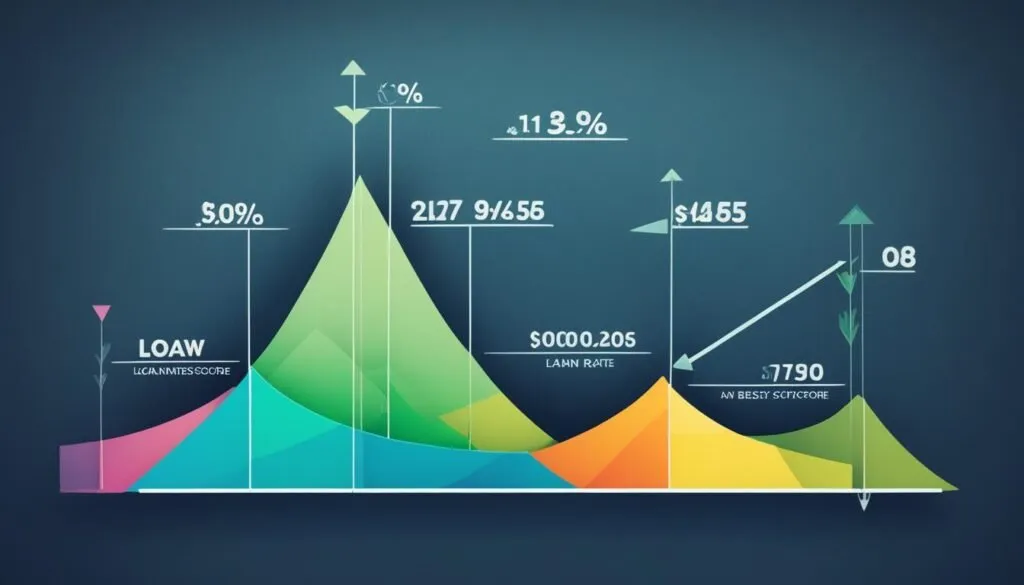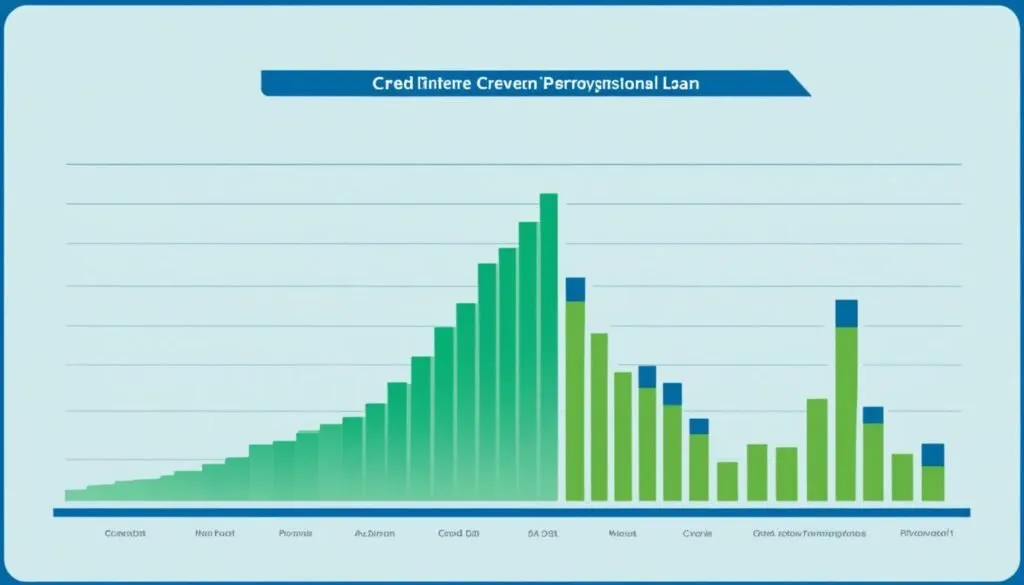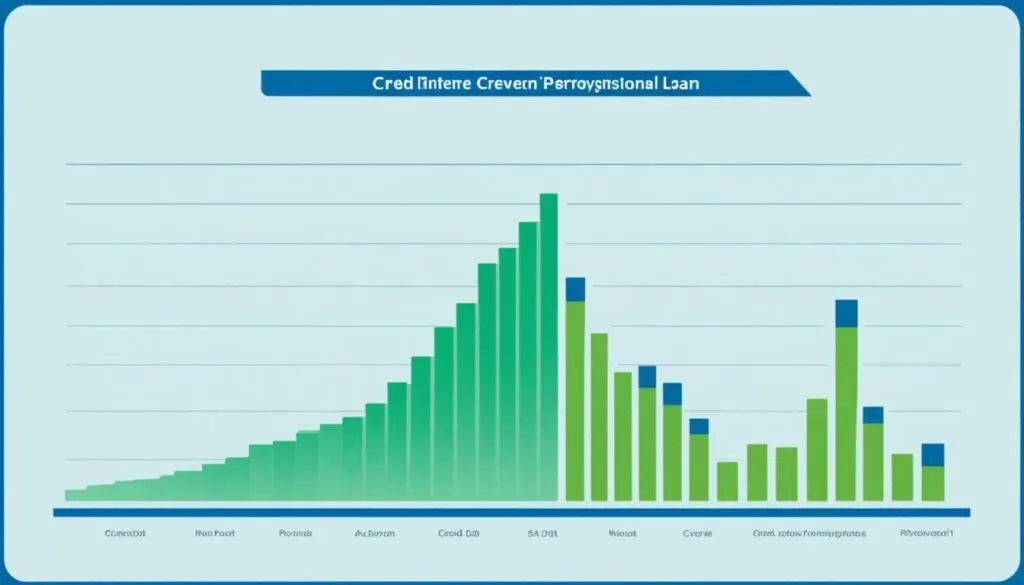Can You Refinance A Personal Loan : Refinancing a personal loan can offer borrowers the opportunity to improve their financial situation by securing lower interest rates or better repayment terms. If you’re wondering if you can refinance a personal loan, the answer is yes. Refinancing allows borrowers to take out a new loan to pay off their existing loan, which can result in potential savings and better loan terms.
There are various personal loan refinance options available, and understanding the process is essential for making an informed decision. By exploring the benefits, steps, and factors to consider, you can determine if refinancing is the right choice for you.
So, let’s dive into the details of personal loan refinancing and discover how it can potentially improve your financial situation.
Key Takeaways:
- Refinancing a personal loan can help you secure better repayment terms and potentially save money.
- By replacing an existing loan with a new loan, you can take advantage of lower interest rates and longer repayment periods.
- Before refinancing, consider factors such as your credit score, financial situation, and the potential impact on your credit.
- Shopping around for the best refinancing rates is crucial to securing a loan with a lower interest rate.
- Be mindful of the pros and cons of refinancing to make an informed decision that aligns with your financial goals.
Understanding Personal Loan Refinancing
Personal loan refinancing is the process of replacing an existing loan with a new loan that offers more favorable terms. This can include lower interest rates, longer repayment periods, or better overall loan terms.
To refinance a personal loan, borrowers need to meet certain requirements set by lenders, such as having a good credit score and a stable income.
There are various companies that specialize in personal loan refinancing, offering competitive rates and flexible options for borrowers.
The Personal Loan Refinancing Process
The personal loan refinancing process involves several steps that borrowers need to follow:
- Evaluate your current loan: Assess your current loan terms, including the interest rate, repayment period, and any fees or penalties associated with early repayment.
- Research refinancing options: Compare different lenders and their refinance personal loan rates to find the best offer that suits your financial needs.
- Gather required documents: Prepare the necessary documents, such as proof of income, bank statements, and identification, to support your loan application.
- Apply for refinancing: Submit your application to the chosen lender and await their decision. This may involve a credit check and underwriting process to determine your eligibility.
- Review and accept the offer: If approved, carefully review the new loan terms, including the interest rate, repayment period, and any applicable fees. Once you are satisfied, accept the offer and proceed with the refinancing process.
- Pay off your current loan: Once the refinancing process is complete, use the funds from the new loan to pay off your existing loan in full.
- Start making payments on the new loan: Begin making monthly payments on the new loan as per the agreed repayment schedule.
By understanding the personal loan refinancing process and refinancing personal loan requirements, borrowers can make informed decisions and potentially save money on their loan.
| Best Personal Loan Refinance Companies |
|---|
| 1. LendingClub |
| 2. SoFi |
| 3. Earnest |
| 4. LightStream |
| 5. Upstart |
These companies are known for their competitive rates and excellent customer service, making them some of the best options for personal loan refinancing.
Refinancing your personal loan can provide financial relief and help you achieve your goals. However, it’s important to thoroughly research and compare options to find the best deal that suits your unique circumstances.
Reasons to Refinance a Personal Loan
Refinancing a personal loan can provide borrowers with various benefits. Consider these key reasons to refinance your personal loan:
- Affordable Interest Rates: By refinancing, you have the opportunity to secure a new loan with lower interest rates. This can save you money over time, as you’ll pay less in interest charges.
- Improved Credit Score: Consistently making payments on your refinanced loan can positively impact your credit score. Timely payments demonstrate responsible financial behavior, leading to an improved credit profile.
- Debt Consolidation: Refinancing allows you to merge multiple loans or credit card debts into a single loan, simplifying your monthly payments. This can help you manage your finances more effectively.
- Lower Monthly Payments: By extending the loan term during the refinancing process, you may be able to reduce your monthly payment amount. This can free up cash flow and provide greater financial flexibility.
- Change in Repayment Terms: If you’re unhappy with the current repayment terms of your personal loan, refinancing offers an opportunity to negotiate new terms that better suit your needs. This could include adjusting the loan duration or changing the payment schedule.
While there are compelling reasons to refinance a personal loan, it’s important to consider the potential impact on your credit score. Refinancing involves a hard credit inquiry and the opening of a new loan account, which could temporarily affect your credit score. However, the long-term benefits of refinancing, such as saving money and improving your credit, often outweigh the initial impact.
Pros and Cons of Refinancing a Personal Loan
| Pros | Cons |
|---|---|
| Opportunity to save money with lower interest rates | Potential for fees associated with refinancing |
| Improved credit score through consistent payments | Possible increase in overall interest costs depending on new loan terms |
| Easier debt management through consolidation | Potential impact on credit score due to a hard credit inquiry |
| Lower monthly payments for improved cash flow | Requirement to meet lender’s refinancing criteria |
| Ability to negotiate more favorable repayment terms | Consideration of short-term and long-term implications on financial well-being |
Before refinancing, carefully weigh the pros and cons of the decision to ensure it aligns with your financial goals and circumstances. Consult with a financial advisor if needed to determine the best course of action.
Steps to Refinance a Personal Loan

Refinancing a personal loan involves a series of steps that borrowers should follow to secure a new loan with better terms. By considering refinancing, you can potentially save money and improve your financial situation. Here are the key steps to guide you through the process:
- Consider refinancing: Start by evaluating whether refinancing is the right option for you. Assess the potential benefits and costs associated with refinancing your current personal loan. Determine if the savings or improved terms outweigh any fees or additional expenses.
- Pay off your loan: Before applying for a new loan, it’s essential to pay off your existing personal loan in full. This ensures a smooth transition and avoids any complications that may arise from having multiple active loans.
- Credit inquiry: Lenders typically perform a credit inquiry when you apply to refinance your personal loan. This helps them assess your creditworthiness and determine the interest rate and terms they can offer you. A strong credit history and score may result in more favorable offers.
- Loan with a new one: If approved for refinancing, you will be offered a new loan to replace your existing one. This new loan will have different terms, such as interest rate, repayment period, or loan amount. Review the terms carefully before accepting the offer.
Following these steps can help you navigate the refinancing process and potentially find a better loan option that suits your financial needs. It’s important to thoroughly evaluate each step and consider the potential impact on your overall financial situation.
Shopping for the Best Refinancing Rates

When it comes to refinancing a personal loan, one of the most critical factors to consider is securing a lower interest rate on the new loan. By obtaining a lower rate, borrowers can save money on interest payments over the lifespan of the loan. To get a lower interest rate, it’s necessary to shop around and compare rates from different lenders.
Comparing rates allows borrowers to make an informed decision and choose a lender that offers the most favorable terms. By taking the time to research and compare, borrowers can potentially refinance their loan with a lower interest rate, resulting in significant savings over time.
In addition to comparing interest rates, borrowers should also consider the loan term when shopping for the best refinancing rates. A shorter loan term, such as 36 months, may result in higher monthly payments but lower overall interest costs. On the other hand, a longer-term loan may offer lower monthly payments but higher overall interest costs. Determining the loan term that aligns with your financial goals is essential in finding the best refinancing rates.
It’s important to note that obtaining a lower interest rate may also depend on factors such as your credit history, income stability, and overall financial health. Lenders typically offer lower interest rates to borrowers with a good credit score and a low debt-to-income ratio.
When shopping for the best refinancing rates, it’s crucial to gather quotes from multiple lenders. This allows borrowers to compare not only interest rates but also other loan terms, such as origination fees, prepayment penalties, and any other charges that may be associated with refinancing.
As you shop for the best refinancing rates, keep in mind that the rate on a new loan is just one piece of the puzzle. Consider your overall financial goals, evaluate the potential savings, and weigh the pros and cons of refinancing before making a decision. By being diligent in your research and taking the time to compare rates, you can make an informed choice and potentially save money by refinancing your loan with a lower interest rate.
Factors to Consider Before Refinancing a Personal Loan

Before deciding to refinance a personal loan, it is crucial to take several factors into consideration. These factors will help you evaluate your options and make an informed decision that aligns with your financial goals.
Credit History
Your credit history plays a significant role in determining your eligibility for a lower interest rate when refinancing a personal loan. Lenders consider your credit score as an indicator of your ability to repay the loan. A higher credit score generally translates into better interest rates and more favorable loan terms. Therefore, before refinancing, take the time to assess your credit history and consider taking steps to improve your credit score if necessary.
Overall Financial Situation
Refinancing a personal loan should be a strategic move that aligns with your overall financial situation and goals. Consider your current income, expenses, and financial stability before applying for a new loan. Assess whether refinancing will provide you with long-term benefits and help you achieve your financial objectives, such as saving money or paying off debt faster.
Exploring Other Lenders
While refinancing with the same bank is convenient, it’s essential to explore other lenders as well. Different lenders may offer varying interest rates, loan terms, and fees. By comparing options from multiple lenders, you can potentially secure better terms that suit your financial needs. Take the time to research other banks, credit unions, or online lenders to ensure you make an informed decision.
Applying for a New Loan
Before refinancing, carefully evaluate the terms and conditions of the new loan. Assess factors such as the interest rate, repayment period, and any associated fees. It is also crucial to calculate the total cost of the new loan, including any upfront fees or penalties for early repayment. By doing so, you can ensure that refinancing will provide you with the desired financial benefits.
In summary, before refinancing a personal loan, consider factors such as your credit history, overall financial situation, and exploring lending options from different institutions. By carefully evaluating these factors, you can make an informed decision that improves your financial well-being in the long run.
The Impact of Refinancing on Your Credit Score

Refinancing a personal loan can have a significant impact on your credit score. While the process of refinancing itself doesn’t directly affect your score, it can indirectly impact it through factors such as a hard credit inquiry and the opening of a new loan account.
When you apply for a refinance, the lender will typically conduct a hard credit inquiry to assess your creditworthiness. This inquiry temporarily lowers your credit score by a few points. However, the impact is usually minimal and short-lived. It’s important to note that multiple inquiries within a short period, often called a “credit shopping period,” are typically treated as a single inquiry, minimizing the overall impact on your credit score.
The opening of a new loan account can also affect your credit score. Your credit utilization ratio, which measures the amount of available credit you’re using, may increase temporarily when you take on a new loan. However, if you consistently make payments on time and manage your new loan responsibly, your credit score will gradually improve over time. This can be an opportunity to demonstrate your ability to manage debt effectively, positively influencing your credit score in the long run.
It’s important to note that whether refinancing improves or harms your credit score depends on various factors, such as your overall credit history, the reason for refinancing, and how you manage the new loan. Consistently making payments on the new loan and continuing to use credit responsibly can outweigh the initial impact of refinancing and ultimately benefit your credit standing.
Key Takeaways
- Refinancing a personal loan can impact your credit score indirectly through factors such as a hard credit inquiry and the opening of a new loan account.
- A hard credit inquiry can temporarily lower your credit score, but the impact is usually minimal and short-lived.
- The opening of a new loan account may temporarily increase your credit utilization ratio, but responsibly managing the new loan can improve your credit score over time.
- Consistently making payments on the new loan and using credit responsibly can outweigh the initial impact of refinancing and benefit your credit standing.
Pros and Cons of Refinancing a Personal Loan

Like any financial decision, refinancing a personal loan comes with both advantages and disadvantages. It’s important to consider the pros and cons before making a decision.
Benefits of Refinancing
One of the key benefits of refinancing a personal loan is the potential to save money on interest payments. By securing a lower interest rate, you can reduce the overall cost of your loan and potentially lower your monthly payments. This can ultimately improve your financial situation and free up funds for other financial goals.
Additionally, refinancing can provide an opportunity to improve your overall financial situation. If your credit score has improved since you initially took out the loan, you may qualify for better terms and rates. Refinancing can also help you consolidate multiple loans into a single payment, making it easier to manage your debt.
Drawbacks of Refinancing
While there are benefits to refinancing a personal loan, it’s important to consider the potential drawbacks as well. One potential disadvantage is the fees associated with refinancing. These fees can include application fees, origination fees, or prepayment penalties. It’s essential to carefully review the fees involved and compare them to the potential savings to determine if refinancing is financially beneficial.
Another factor to consider is the potential for increased overall interest costs. If you extend the term of your loan when refinancing, you may end up paying more in interest over the life of the loan, even if the interest rate is lower. It’s important to carefully evaluate the terms of the new loan and calculate the total cost before deciding to refinance.
“By securing a lower interest rate, you can reduce the overall cost of your loan and potentially lower your monthly payments.”
- Lower interest rates
- Potential improved financial situation
- Consolidation of multiple loans
- Higher overall interest costs
- Associated fees
Considering both the benefits and drawbacks, it’s essential to weigh the potential savings against the costs associated with refinancing. Understanding your financial goals and analyzing the terms of the new loan will help you determine if refinancing is the right decision for you.
“By securing a lower rate, you can reduce the overall cost of your loan and potentially lower your monthly payments.”
| Pros | Cons |
|---|---|
| Opportunity to save money on interest payments | Associated fees |
| Improved financial situation | Potential for higher overall interest costs |
| Consolidation of multiple loans |
Conclusion
Refinancing your personal loan can have a significant impact on your financial well-being. By taking advantage of lower interest rates and better loan terms, you have the opportunity to save money and improve your overall financial situation.
When you refinance your personal loan, you may be able to reduce your monthly payments, allowing you to have more disposable income. This can be especially beneficial if you are looking to free up some cash for other financial obligations or to achieve your other financial goals.
It’s important to carefully evaluate the costs and benefits before deciding to refinance. While refinancing a personal loan may provide several advantages, such as withdrawing from the loan account or refinancing a personal loan may reduce your monthly payments, it’s crucial to consider both the short-term and long-term implications. Make sure to consider any fees associated with refinancing and the potential for increased overall interest costs depending on the terms of the new loan.
In conclusion, if you are looking to refinance your personal loan, it’s essential to thoroughly assess your financial situation and goals. By considering the potential benefits and drawbacks, you can make an informed decision that aligns with your needs and helps you achieve your desired financial outcome.
Also Refer : Easy Loan Online Application Process
FAQs
Q: Can you refinance a personal loan?
A: Yes, you can refinance a personal loan by taking out a new loan to pay off the original one.
Q: How does refinancing your personal loan affect your credit score?
A: Refinancing a personal loan may affect your credit score in the short term, as it involves a hard inquiry on your credit report. However, if you make timely payments on your new loan, it could have a positive impact on your credit in the long run.
Q: What are the disadvantages of refinancing a personal loan?
A: Some disadvantages of refinancing a personal loan include paying additional fees, potentially extending the term of the loan, and the possibility of ending up with a higher interest rate.
Q: When should you consider refinancing your personal loan?
A: You should consider refinancing your personal loan when you can secure a lower interest rate, lower monthly payments, or better loan terms than your current loan offers.
Q: What should you consider before refinancing a loan?
A: Before refinancing a loan, you should consider your current credit score, the terms of the new loan offer, any fees associated with refinancing, and how long it will take to pay off the new loan.
Q: Will refinancing a personal loan affect your credit?
A: Refinancing a personal loan may briefly hurt your credit due to the hard inquiry and the new loan account. However, as you make on-time payments on your new loan, it can help improve your credit over time.
Q: Should you wait to refinance a personal loan?
A: You may want to wait to refinance a personal loan if your credit has improved significantly since taking out the original loan, as this can help you qualify for better loan terms and interest rates.